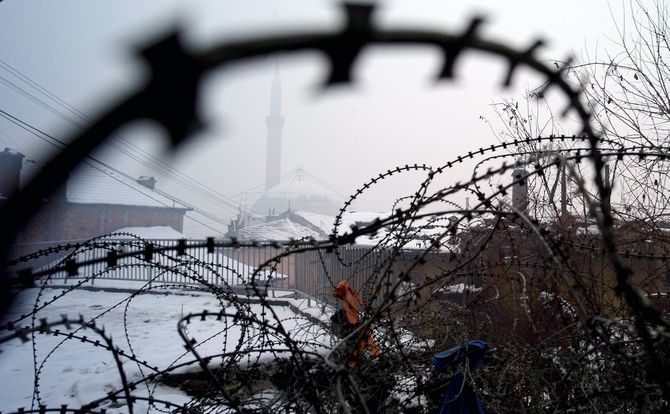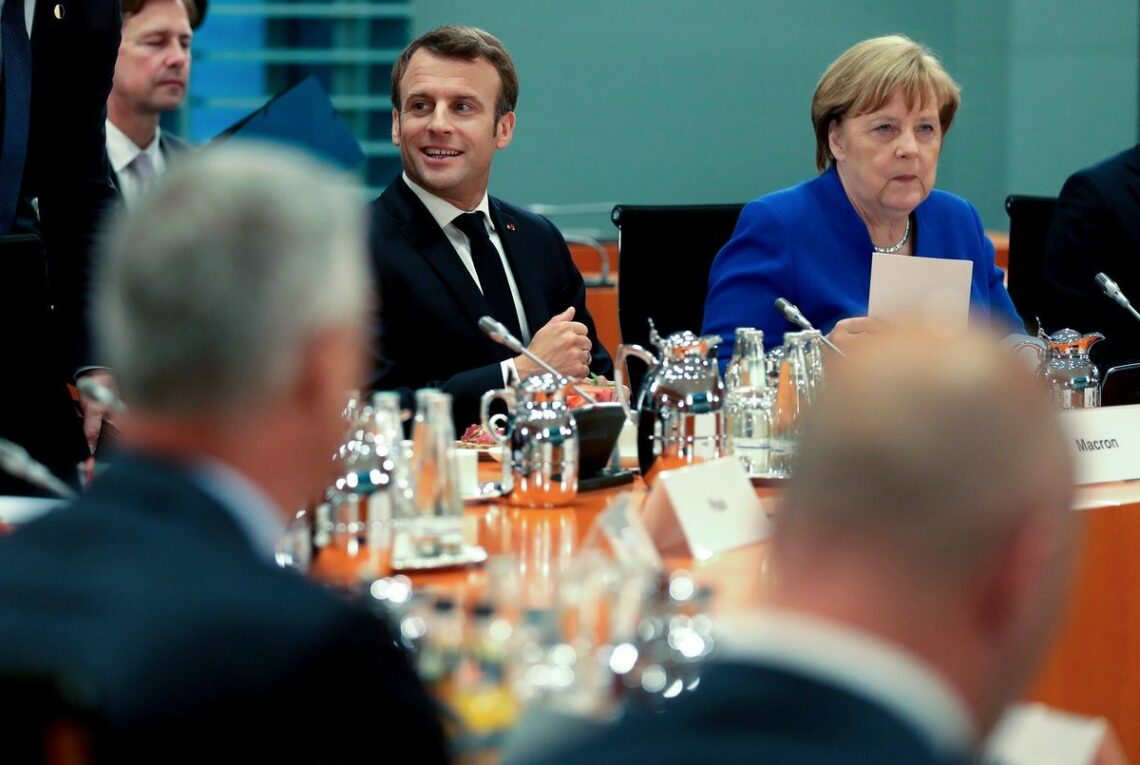The geopolitics of a Kosovo-Serbia deal
Normalizing relations between Serbia and Kosovo has proved surprisingly difficult. After the EU’s protracted Brussels Dialogue stalled last year, Germany and France have stepped in with a new effort at mediation. If it fails, the Western Balkans could end up waiting another decade for EU membership, with unpredictable consequences.

In a nutshell
- The unresolved Kosovo-Serbia dispute is more than a bilateral or regional issue
- The U.S., Russia and the EU each propose different geopolitical resolutions
- Alarmed at how EU-sponsored talks have stalled, France and Germany are intervening
- Their mediation could bring quick closure or delay Balkan EU entry by a decade
To paraphrase Churchill’s famous quip, the Balkans have always produced more problems than they can solve. The most recent demonstration of this tendency is the rocky normalization process between Kosovo and Serbia. This local Balkans issue is having a surprisingly large geopolitical impact.
Until recently, it had been assumed this holdover problem from the early 20th century would be resolved in the second decade of the 21st. But three concerted efforts by the international community – the Rambouillet talks (1999), the Vienna negotiations (2005-2006) and the Ahtisaari Plan (2007) – failed to yield a solution acceptable to both parties. The ongoing Brussels Dialogue (2012-2019), mediated by the European Union, has also not produced results. With the whole process now in question, it appears likely that no agreement will be reached by the end of this year. Even 2020-2021 looks doubtful as a closure date.
Different preferences
Establishing normal relations between Kosovo and Serbia – which have been in a nominal state of war for two decades – is more than a bilateral issue or a regional problem. Its geopolitical dimension is best shown by the views of the three (or even four) global players, each of which prefers a different option. The United States insists on a mutually agreed peace settlement that may include border revisions, according to National Security Advisor John Bolton. Russia is for “any solution that is acceptable to Serbia.” The European Union wants a normalization agreement that could also possibly allow exchanges of territory. Yet Germany and France, the EU’s dominant tandem, are adamantly opposed to any territorial changes.
These conflicting positions will complicate the search for a final settlement. As things now stand, it is possible to distinguish three timelines for a potential agreement.
The first, short-term scenario would see a resolution before the end of 2019, but it is also the least likely. Under a more probable second scenario, an agreement will be reached over the next two years, before the end of 2021. The third scenario assumes the normalization process will be prolonged beyond 2022, making its future course and outcome unpredictable.
‘Mercron duet’
In all three scenarios outlined above, the restoration of normal relations between Kosovo and Serbia is treated as a multilateral process. This was confirmed by the EU’s latest informal summit on the Western Balkans, held in Berlin on April 29. At that meeting, German Chancellor Angela Merkel and French President Emmanuel Macron decided to take control of the Brussels Dialogue, which had been stalled for almost a year under the mediation of EU High Representative for Foreign Affairs and Security Policy Federica Mogherini.
Berlin and Paris looked critically at the European Commission’s willingness to consider border changes.
This step was a tacit rebuke to the protracted efforts of two European Commissions and their diplomatic chiefs, Catherine Ashton (2009-2014) and Ms. Mogherini (2014-2019). The Berlin meeting marked an effective change of leadership, putting the “duet” of Germany and France in charge of the normalization talks, even though Ms. Mogherini remained in place as the dialogue’s nominal mediator.
The negotiations had stalled in mid-2018 after Kosovo accused Serbia of not honoring its pledge under the Brussels Agreement (2013) not to block its membership in international organizations, such as Interpol. In retaliation, Pristina announced import tariffs on Serbian products in November 2018. Serbia then boycotted further meetings of the Brussels Dialogue.
Another reason why Berlin and Paris looked critically at the European Commission’s handling of the negotiations was its willingness to consider possible border changes. This was anathema to Chancellor Merkel and President Macron, the so-called “Mercron duet.”
After it was clear that the normalization talks had veered off course, in August 2018, Serbian President Aleksandar Vucic announced a “final plan” that would include a territorial swap with Kosovo. Ms. Mogherini was amenable to this proposition, but not so Chancellor Merkel, who reiterated Germany’s fundamental position: territorial changes in the Balkans are unacceptable, and any normalization agreement between the two states must respect existing borders. She confirmed this position on June 6, at a meeting with Kosovo Prime Minister Ramush Haradinaj in Berlin.
Decade delay
Even Serbia’s President Vucic acknowledged that the informal Berlin summit had sounded the death knell of his plan for a “compromise border agreement.” This assessment was shared by Kosovo’s prime minister, who told reporters in early May that “the border exchange option is history.”
The next move is up to the Franco-German initiative, which is next expected to meet in Paris on July 1. One day after the informal Berlin summit, President Macron officially announced a “French Strategy for the Western Balkans,” taking a much tougher approach toward the EU enlargement process in the region. The apparent message to applicant countries was that unless they delivered genuine, deep reforms in the rule of law and security chapters of the acquis communautaire, they could expect a long wait for accession to the Union.
The Western Balkans countries fear that the EU’s stated target of 2025 for accession is no longer valid.
The French document met a cold reception in the Western Balkans, where it was seen as signaling that the European Commission’s stated target of 2025 for accession was no longer valid, and that the probable accession date had been put off until 2030. That would expose the Western Balkans to another decade of emigration by its youngest and best-educated. This catastrophic brain drain has already cost the region 6 million people, or one-third of its population, according to an estimate by Suma Chakrabarti, the president of the European Bank for Reconstruction and Development (EBRD).
Think tanks like Carnegie Europe have criticized the absence of a clear EU policy toward the Western Balkans, warning that this neglect could lead to more Russian and Chinese influence in the region. This brings the security agenda back to the fore, as preventing the region from slipping away from its Euro-Atlantic orientation takes priority over the previous emphasis on stability as a guiding approach.
Bismarckian echoes
The Berlin summit had two clear takeaways: 1) the Brussels Dialogue must be restarted from scratch; and 2) border changes must be avoided as part of a Kosovo-Serbia settlement. Little more can be expected from the EU’s central authorities over the next six months. After the May elections to the European Parliament, a new European Commission must be selected and a new High Representative and mediator for the Kosovo-Serbian dialogue chosen. Realistically, Ms. Mogherini is a lame duck and her replacement will not be known until October. To avoid losing further time, the new Franco-German initiative is intended to bridge this interregnum over the next six months.

For observers of Chancellor Merkel’s Berlin summit, it is impossible to ignore certain echoes it evoked of the 1878 Congress of Berlin, organized by her illustrious predecessor Otto von Bismarck to resolve the vexing “Eastern question.” Almost a century and a half later, Europe still seems to have no clear answer about what to do with the Western Balkans. The region’s borders and political maps are still unfixed, and the national enmities that set its states against each other remain unresolved.
Most of all, instead of becoming part of the EU, the region is stuck firmly in the east. Its position is the same as two centuries ago: a European periphery.
Europe neglected
After Berlin, the duet-led normalization talks will continue this summer in Paris and with the sixth round of the so-called Berlin Process (EU-Balkans summits that have been held annually since 2014) in Poland. There could also be another meeting in Washington before the end of the year, but only if Pristina and Belgrade reach a deal.
Realizing the first, short-term scenario would require achieving a settlement between Kosovo and Serbia during this seven-month interval. That is a very short time to resolve such a complicated dispute. It is also an unreasonably brief period to achieve a consensus among the competing international interests – especially Europe, Russia and the U.S.
Donald Trump has already invited the presidents of Kosovo and Serbia to the White House if they reach a deal.
U.S. President Donald Trump has already invited his Kosovar and Serbian counterparts, Presidents Hashim Thaci and Aleksandar Vucic, to the White House if and when they reach a final deal. This offer has already been described as a new “Camp David” accord for Balkan peace, similar to that reached four decades ago between Israel and Egypt. But keen observers have noted that Mr. Trump’s invitation may have played a role in the new Balkan initiative launched by Ms. Merkel and Mr. Macron.
That demarche can be interpreted not just as a reaction to the slow progress of the Brussels Dialogue, but also as a message to Washington that Europe’s two biggest powers will not be ignored in Balkan matters. For Chancellor Merkel, a peace agreement could be her last international achievement in office, bearing in mind her decision to step down by the end of 2020. For President Macron, successful mediation would shore up his international reputation, which has lately suffered from reverses in Libya and elsewhere. It would also promote his new vision for the EU, which sees the bloc deepening its integration before further expansion.
The U.S. and Russia
As for the other key players, the U.S. is gearing up for a presidential election in 2020, while Russian President Vladimir Putin will reach the midpoint of what could well be his final presidential term. There was no immediate indication that the Kosovo-Serbian dispute was mentioned in two meetings in early May between U.S. Secretary of State Mike Pompeo and Russian Foreign Minister Sergei Lavrov. With tensions between the two powers running high over: Venezuela, Ukraine, Syria, and alleged Russian meddling in U.S. elections, the Western Balkans may have been put on the Trump administration’s back burner. If so, that would postpone much-needed clarification of the American position on the security of southeastern Europe.
Russia, by contrast, remains intensely interested in the region. Its handling of the Serbia-Kosovo dispute seems identical to its approach to the 27-year contest between Greece and North Macedonia, which ended this year after both countries’ parliaments ratified the Prespa Agreement of June 2018. In that case, Moscow consistently sided with Greece in its opposition to Macedonian membership in NATO. Now, Russia is Serbia’s key advocate in attempts to block Kosovo’s membership in the United Nations, Interpol and other international organizations.
Sooner or later
For all the obstacles above, it is surprisingly easy to sketch the outlines of a compromise between Kosovo and Serbia. In the first phase, it would come down to a simple swap: UN for EU. Belgrade would drop its objections to Kosovo gaining a seat in the UN, while Pristina would affirm that relations with Serbia had become sufficiently “normalized” to unblock Chapter 35 (dealing with Kosovo) of Serbia’s accession negotiations with the EU. This would not yet amount to a peace settlement or the restoration of full diplomatic relations, but it would be a fair trade.
To gain diplomatic momentum, Ms. Merkel and Mr. Macron must pressure Pristina and Belgrade for two quick decisions.
The only way this scenario becomes feasible is with full backing from the Franco-German duet, to win support at the European Council, and a U.S.-Russian consensus, to overcome any opposition at the UN Security Council. To gain diplomatic momentum, Ms. Merkel and Mr. Macron need to pressure Pristina and Belgrade for two quick decisions: lifting of Kosovo’s tariffs on Serbian goods, and withdrawal of Serbian objections to Kosovo’s membership in international organizations. Unless these steps occur within the next two or three months, the chances of a short-term resolution vanish.
A target date of 2020-2021 for full normalization is more realistic simply because of the two-year timetable. This gives more time not only for politicians in Kosovo and Serbia, but also among the big players. The U.S., Russia and the EU will have greater opportunity to sort out their regional priorities, from Ukraine to the Balkans and the Middle East. Chancellor Merkel will certainly want to close her political career with a diplomatic triumph, though it would be hard to expect President Trump, in the midst of a tough campaign for reelection, to spare much time for the Western Balkans.
Things get more complicated if a final settlement is delayed beyond 2021. Balkan conflicts seldom improve when allowed to fester. More importantly, as time goes by, the chances increase of wholesale leadership changes – not just in the EU and the U.S., but also in Serbia, Kosovo and even Russia. President Thaci in Kosovo and President Vucic in Serbia end their terms in 2021 and 2022, respectively. New heads of state may have different agendas or need extra time to master issues that baffled their predecessors.








